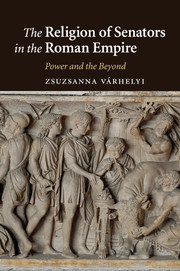6 - Innovations and aspirations
Published online by Cambridge University Press: 06 July 2010
Summary
Moving beyond regular and generally accepted practices and discourses, in this final chapter I turn to less usual and more ambivalent religious phenomena among senators. I seek to analyze senatorial religious aspirations that extend beyond the customs and norms created and accepted by their peers, and beyond the regulations enforced by imperial rule. Identifying these trends provides evidence for the investment of senators in the creation and application of innovative religious ideas, proving that senators were active agents in the construction of an imperial religion that was meaningful to them.
Significantly, as we will see, in turning to less mainstream religious interests senators focused on divine notions typically associated with the imperial cult, demonstrating the close connection between senatorial and imperial religion, a result discovered in Part II as well. Yet, as I argue, applying these divine associations to themselves, senators also appear to show an imaginary engagement with these religious phenomena, that is, an individual interest and investment in the forms of imperial religion closely connected to their own ideas about themselves. To make this point, I first discuss the worship of the genius of a living person, both for and by senators, showing that innovations in religious matters worked both ways: not only senators copying emperors, but also the other way around. Next, I consider the posthumous worship sought for and by them, practices that shared the religious framework of the imperial cult.
- Type
- Chapter
- Information
- The Religion of Senators in the Roman EmpirePower and the Beyond, pp. 186 - 208Publisher: Cambridge University PressPrint publication year: 2010



